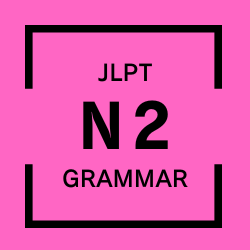例文
彼は身長のわりに足が短い。
He has short legs for his height.
意味
~から普通予想される程度と比べると
用法
「A わりに B」の形で、Aから普通に想される程度と比べるとBだ、Aから予想される程度とBが釣り合っていない、と言いたい場合に使われます。
英語 considering~, for ~
"A warini B" is used to say that the degree of 'B' is not proportional to/doesn't match the degree normally expected from 'A.'
詳しい文法解説 grammar point
▷「のに」と「わりに」の違い①
「A わりに B」は、「B」という評価が「A」から予想される程度と釣り合っていないときに使われます。したがって、例文1のように「B」に程度性のあるものを述べないときに「わりに」は使えません。
例文2のように「B」が程度性のある場合はどちらも使えますが、「わりに」は、程度の不釣り合いさが意識された言い方です。
1. 気をつけていたわりに、財布を盗まれてしまった。✖
(気をつけていたのに、~)○
Even though I was careful, my wallet was stolen.
2. たくさん勉強したわりに、いい点が取れなかった。○
(たくさん勉強したのに、~)○
I studied a lot, but I couldn't get a good score.
▷「のに」と「わりに」の違い②
「値段のわりに、身長のわりに」など、「わりに」が前に程度を表す言葉を直接取れるのに対し、「~のに」はその程度がどうかを述べる必要があります。
3. あのホテルは値段のわりにサービスがいい。○
That hotel has good service for the price.
4. あのホテルは値段なのにサービスがいい。✖
(あのホテルは値段が安いのにサービスがいい。)○
▷「わりには」
それが期待されている程度と比較してでの評価であることを強調するときに「わりには」と助詞「は」と一緒に使われます。
5. 彼は年齢の割に若く見える。〇
He looks young for his age.
6. 彼は年齢の割には若く見える。〇
He looks young for his age.
接続 formation
V/イ形/ナ形/N(普通形) + わりに
※ナ形の非過去肯定:だ→な
※名詞の非過去肯定:だ→の
関連文法 related grammar

~のに
- JLPT N2 Grammar

~にしては
- JLPT N2 Grammar

~くせに
- JLPT N2/N3 Grammar

~からすると/からしたら/からすれば
- JLPT N2 Grammar
例文 example sentences
・100万人以上チャンネル登録者数がいる割に、一本の動画の再生回数は少ない。
Considering the number of subscribers to the channel with more than one million, the number of views per video is small.
・彼は年齢の割に落ち着いている。
He is calm for his age.
・あそこの店は、あの値段のわりにはおいしくない。
Considering the price, the food there is not that good.
・10年この仕事をしているわりには、彼はスキルが身についていない。
Considering he has been doing this job for 10 years, he has not developed the skills.
・やる気があると言っているわりには、行動した形跡が見られない。
Although you say you are motivated, I don't see any evidence that you have taken action.
・日曜日のわりに空いているね。
It's empty for a Sunday.
・彼はパーティーが苦手だと言っていたわりには楽しんでいるように見えた。
Although he said he didn't like to party, he seemed to be enjoying himself.
・彼は歌手のわりに、あんまり歌がうまくない。
Considering he's a singer, he doesn't sing very well.
・彼は大学一年生のわりに将来のことをきちんと考えている。
Considering he is a freshman in college, he has a good idea of what his future holds.
・彼女は全然勉強していないと言っているわりには、いつもいい成績をとる。
She always gets good grades, even though she claims she doesn't study at all.
備考 notes
「割に」は、副詞として(前に修飾成分を伴わず)使われる場合もあり、「割と」と同じように、「比較的、思ったより、普通と比べると」といった意味を表します。
・このスイカは割に安かった。
(≒割と安かった、比較的安かった)
This watermelon was relatively cheap.
漢字表記/ひらがな表記について
「~わりに」を漢字表記する場合は「~割に」となります。漢字表記する場合と、ひらがな表記する場合のどちらの場合もあり、どちらを正しいとするかの明確な基準はありません。新聞などの記事を見ても、どちらも使われています。
稲刈りに訪れてがっかりしたのは、苦労した割に雑草がかなり生い茂っていたこと。
(朝日新聞 '94.10.13)
What disappointed me when I visited to harvest the rice was that the weeds were quite thick for all the hard work.
でも、軽く小さく、操作が簡単で、そのわりに写りがいいコンパクトカメラが現れて、撮影者の層は一気に広がった。
(朝日新聞 '94.11.28)
However, the emergence of compact cameras that were lightweight, small, easy to operate, and produced excellent images in spite of their size, quickly broadened the range of photographers.
<参考文献>
奥村大志『話者の見積もり表す機能語─「わりに(は)」「にしては」に見られる話者の捉え方─』

If you have any questions about this grammar, please comment below.
